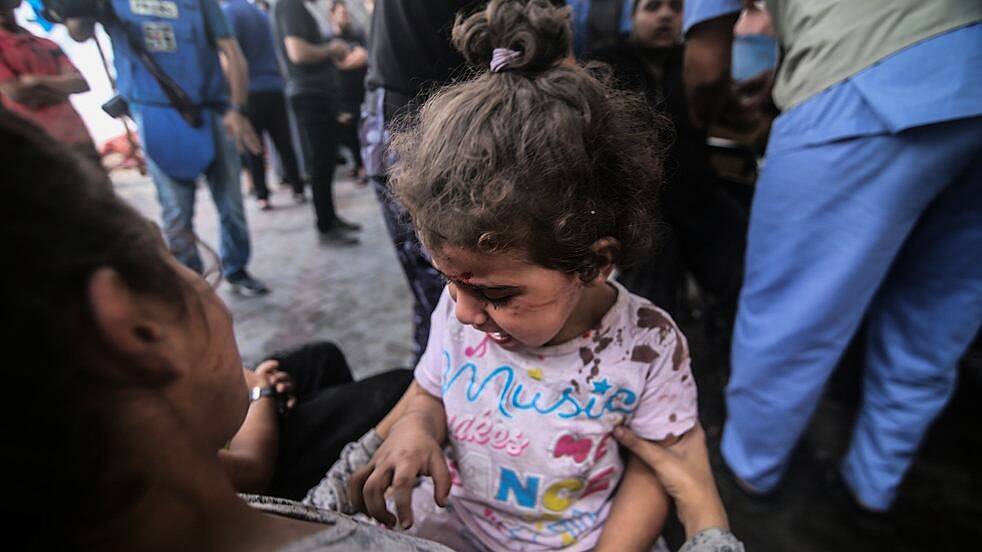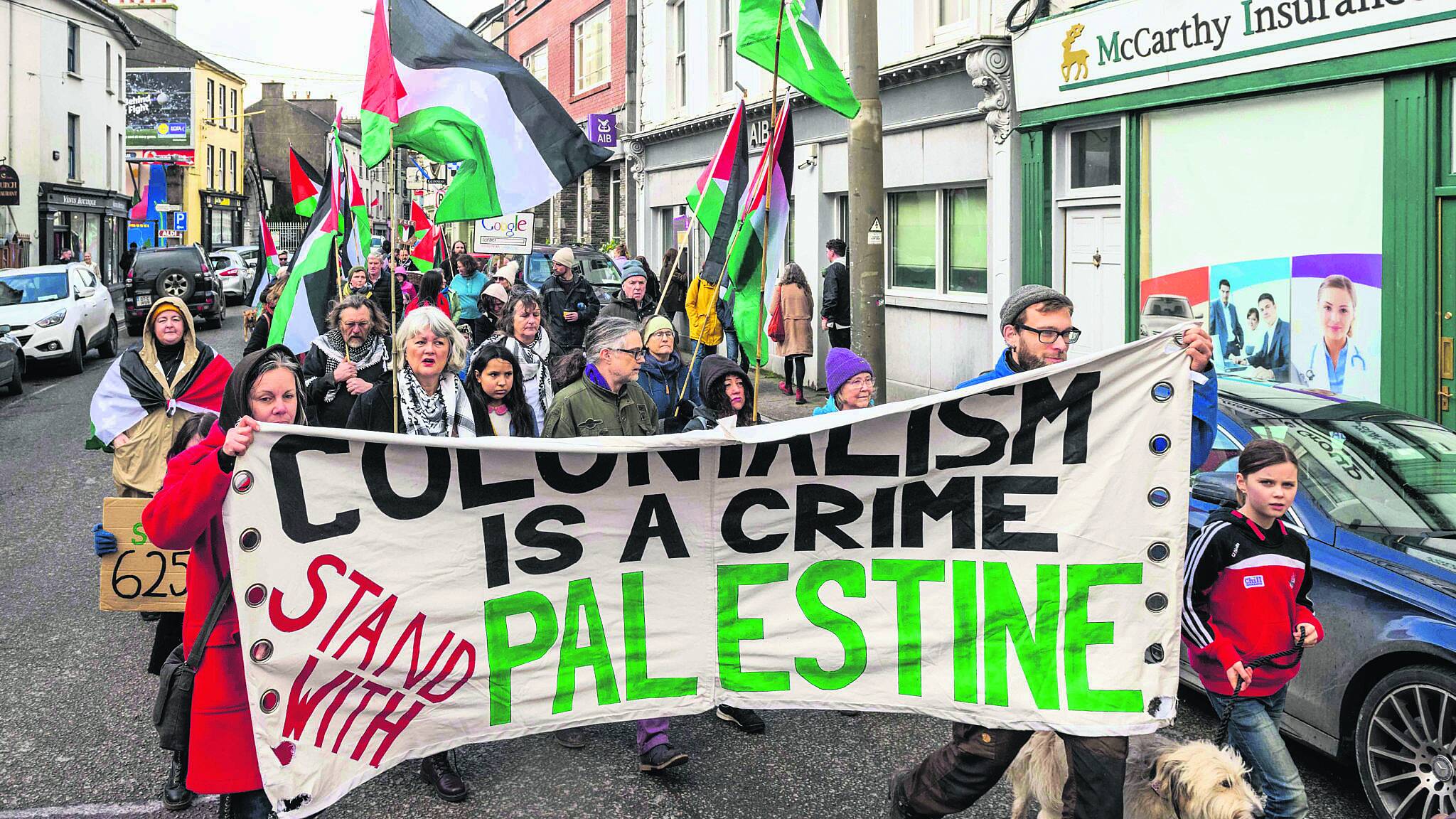As Ireland commits to fully recognising Palestine, PEADAR KING meets a barber who has never lived in his own country but now calls West Cork his home
AS body after body was being exhumed from mass graves in Gaza, I met with Palestinian Ahmad Hallak over falafel and chips in a nearby restaurant close to his Chop Shop barbershop in Skibbereen.
His response to what was unfolding in the country that was home to his grandparents was to pause and look away. Sometimes words fail.
Ahmad’s grandparents were, along with hundreds of thousands of Palestinians forced from their homes into refugee camps in southern Lebanon in 1948, in what Palestinians call The Nakba or the Great Catastrophe.
At that moment, I was reminded of the first time I met with Ahmad. It is easy to place the day. October 27th, 2023, the day the wholly inappropriately named Israeli Defence Forces (IDF) entered Gaza. As I sat in his swivel chair for what I had thought was to be a routine hair and beard cut, he watched, with an increasing sense of foreboding, the livestreaming of IDF tanks rolling into Gaza, an area less than half the size of Louth, but home to 2.3m people.
 Southern Star letter writers say it has been very hard to watch what is happening in Gaza. (Photo: Shutterstock)
Southern Star letter writers say it has been very hard to watch what is happening in Gaza. (Photo: Shutterstock)
Again, words seem to fail. In their place, as he stood behind me, I could sense his deep inhalations and exhalations as if darts of pain were ricocheting through his body. On the mirror, I could see reflections of the contortions on his face. He managed some words, but in Arabic. I don’t speak Arabic. I didn’t need to.
Ahmad Hallak was born in the Rashidieh refugee camp in southern Lebanon in 1984. The camp was built to accommodate refugees who fled from Deir al-Qassi, Alma, Suhmata, Nahaf, Fara and other villages in Palestine.
‘My grandparents were farmers,’ Ahmad tells me. ‘They were a wealthy family. They had olive trees, orange trees.’
Without breaking stride, he tells me that they still have the key to the home they left behind. Along with documents that attest to their ownership of their property in Palestine. Keys to their Palestinian homes are an important keepsake for Palestinians, a critical lifeline to the home from which they were ejected.
‘Our home was in Akka, now a city on the coastal plain of northern Israel,’ he tells me. Without prompting, he reaches for his phone and shows me the village. We peer at the images.
‘It is very beautiful, very historical. I could have grown up there. I should have grown up there,’ he tells me.
Life was hard growing up in the refugee camp that was home to 20,000 Palestinians, ameliorated, at least to some degree, by the now much-maligned (by the United States and other Zionists) United Nations Relief and Works Agency (UNRWA). Initially he and his grandfather, parents, two sisters and two brothers lived in a one-bedroomed house.
‘I used to sleep in the kitchen.’ His father found occasional work as a day labourer but work opportunities in Lebanon were strictly limited. Typically, he would earn $10 a day, not enough to feed eight people. ‘We were often short of food, a bit of bread, a cup of tea and sugar.’
UNRWA provided him with an education. He trained as an office and computer maintenance engineer and did a bit of barbering on the side. UNRWA is a lifeline for Palestinians he tells me, and is grateful to the Irish government for its increase of €20m to the UNRWA budget. He simply fails to understand why other countries, most particularly the US, have cancelled funding the critical lifeline that UNRWA offers to starving Palestinians in famine-like conditions.
‘Ireland is doing more than many other bigger countries,’ he says. And then a phrase that stayed with me long after the interview ended. ‘Irish hearts beat with Palestinian blood.’
‘I have never been to Palestine. I have never lived in my own country. I have never felt my own soil. Here is a place I now call home; I can do that.’
 Protestors taking part in one of the weekly marches for Gaza which are held every weekend in Skibbereen, and in other towns in West Cork.(Photos: Andy Gibson)
Protestors taking part in one of the weekly marches for Gaza which are held every weekend in Skibbereen, and in other towns in West Cork.(Photos: Andy Gibson)
Ahmad left Lebanon in his early 20s. Asked why and how he came to Skibbereen, his face lights up: his signature barbershop lightness of touch.
‘Why not?’ he laughs. ‘You have heaven on earth here. The people here are really kind, friendly, generous. The Irish are amazing people.’
Tips in his barbershop are for relief in Gaza. One man apologised his tip was so small, only to return shortly afterwards with €200. This is home.
He and his wife Rasha Ataya have just had their second baby – Youssef, brother to Mahmoud (4). As we sit and talk by the café window looking out on North Street, it is clear that Ahmad has made his mark on the town. People knock on the window; some call in to say hello.
The usual knockabout humour in such short interactions is very much to the fore. Serious moments too. He is keen to tell me about his involvement with the Cork West Civil Defence and the work they do. Despite the levity on which the conversation has turned, grief for what is happening to Palestine is never far away.
‘Watching what is happening in Palestine leaves a scar on the heart. It melts the heart watching what is happening to the Palestinian children.
‘Sometimes you have to cry and let it out. It is so painful watching your people being slaughtered, minute by minute. It stays in your head, and you remain in a very dark tunnel.’
Briefly, Ahmad retreats into silence. Unsure about when it’s appropriate to break his silence, I tentatively ask if he ever thinks a day will come when he will visit a free Palestine. The mood changes, his infectious smile returns.
‘I will. Rasha and I along with our two kids will, one day, visit a free Palestine.’
This time words don’t fail.










